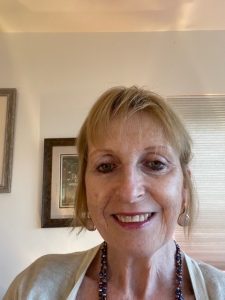Janice's story
In 2011, Janice was diagnosed with Acute Disseminated Encephalomyelitis (ADEM), a condition that involves inflammation and damage in the brain and spinal cord.
ADEM has been a lonely path because there are so few of us. Even if the condition was more common, it affects us all so differently that ticking boxes just can’t be done. I sometimes feel like I don’t fit in anywhere and often have to find information for myself. I understand that GPs won’t be experts in everything, but in my experience they don’t know anything about ADEM, which makes me feel more alone. In 2011, I contacted the Brain & Spine Foundation Helpline nurses and I learnt more from them than I did anywhere else. I have also made a lot of really good friends on the way, they are friends I wouldn’t have known if it weren’t for this condition.
Because of ADEM, I have been partially sighted for eleven years and a lot of work and thought has had to go into my basic living environment. Since my diagnosis, I moved into a more accessible house which provided and en-suite and wider staircase. I can’t feel water when it is hot, so I have to be careful when using taps. I can hardly hold a knife. It’s difficult, life feels quite hellish at times. I wish I had an illness where there are clear care and support pathways set out, and experts on hand. But I don’t have that.
The pandemic has not been easy for me, especially when I have really needed to see my GP. However, I am so grateful that I have access to technology and the knowledge to use it – without it I would have been lost. FaceTime was a saviour, I was still able to see my granddaughter and we would play virtual treasure hunts. I have an impressive and colourful walking stick collection and she would choose which one I would use that day. This was fun, but we should have been skipping and dancing together instead.
So much has changed for me. I can’t hold a pen or write properly any more. I start off alright but I struggle to concentrate and I can’t see it very well and it becomes too difficult. I find it difficult to write greeting cards. I want to write nice, long messages but can only manage a few words. This might seem trivial to some people, but it means a lot to me. I have found that it’s not the big changes that matter, it’s all the little things I can’t do which hurt the most. I was a clever person, good with words and a very good writer. To be robbed of this is tough.
I like watching football and St Johnstone FC have been brilliantly supportive, they are excellent and help me and others a great deal. I get a discount to games and a carer is allowed to come with me. Away clubs also have been very helpful to me, I like to talk about my positive experiences to encourage others to continue to go out and watch the games! I am also a Saints fan. They have done so much to support me, even employing someone whose job it is to help disabled fans. From my experiences I have found that when people communicate more and share knowledge, it helps people have more understanding of hidden disabilities.
I’ve got 3 dogs, Poppy, Dylan and Freida. Poppy was with me before I was unwell and her and George were a huge incentive for my recovery and rehab work. My dogs have had so many benefits to my recovery. Their company loyalty and their devotion is unswerving.
My advice to anyone living with a disability would be to ask questions. Ask what can be provided and say what can be done to help you. I hate asking for help, but over the years I have had to ask more and more. There is more support out there for disabled people than you may realise, it’s just finding it that is the difficult part. I’ve found that most people are lovely and I’ve had more good experiences than bad. I’m lucky in that I have lots of family and my dogs, but not everyone has that. How can we make it easier for people to ask for help?

Sharing your story helps drive positive change for people affected by neurological conditions. We like to share the experiences of real people who are using, fundraising or volunteering for our services to help raise awareness of neurological conditions.
There are many ways to share your story with us – in written format, as a video recording or an audio recording, we even have people share their story through artwork. It’s up to you which you most feel comfortable with.
To share your story, get in touch with us. We’d love to hear from you.